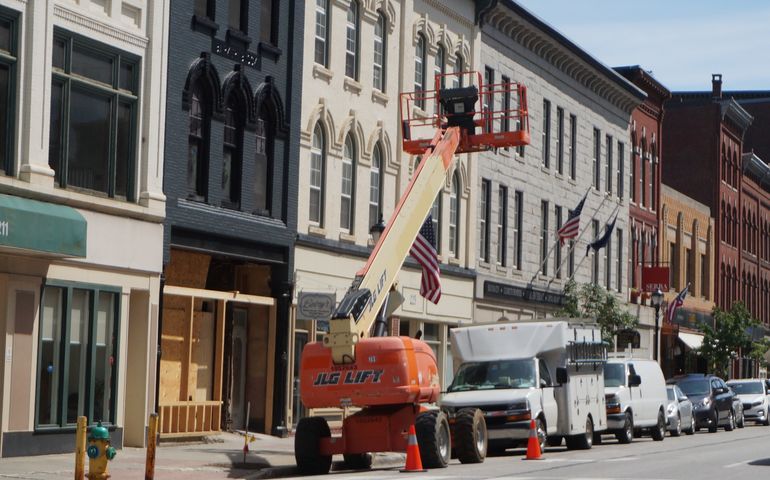Report: Maine Historic Preservation Tax Credits projects have generated $166M in tax revenue
 Photo / Maureen Milliken
Maine's Historic Preservation Tax Credit program has contributed more in tax money that it's taken, and leveraged development in downtowns across the state, including a variety of programs in Augusta, a new report says.
Photo / Maureen Milliken
Maine's Historic Preservation Tax Credit program has contributed more in tax money that it's taken, and leveraged development in downtowns across the state, including a variety of programs in Augusta, a new report says.
Over the past four years, the state's Historic Preservation Tax Credit program has added $166 million to local property tax rolls, including $17 million in new property tax payments, bringing in more money that has been paid out, a new report says.
The program, which the Legislature recently extended to 2025, has generated $3 million more in tax revenues than have been spent in state and federal tax credit since 2016, according to the Maine Historic Tax Credit Economic Impacts Report released Monday by Maine Preservation, in partnership with Coastal Enterprises Inc., Greater Portland Landmarks, GrowSmart Maine and the Maine Real Estate & Development Association. The study was done by Charles Lawton and Frank O'Hara.
The report estimates that the net economic benefit to Maine state and local governments will double to at least $6 million annually by 2022.
The credits have also created hundreds of full-time jobs, generated millions in construction investment, thousands of units of affordable housing and had a ripple effect on downtown development, those involved in the report said.
"This is exactly how we build our economy," said Greg Paxton, executive director of Maine Preservation, in a news conference this morning to present the report and advocate for further extension of the program in Maine.
Elizabeth Frazier, a government relations attorney at Pierce Atwood, said that the program is "exceptional" in that fact that it is now generating more money than is spent on it, something that's not a stated goal of tax credit programs, which are designed to be incentives to development.
The Maine State Rehabilitation Tax Credit allows 25% credit for any historic rehabilitation that also qualifies for the 20% federal credit. Projects are paid for up front and must meet benchmarks throughout the development to qualify for the credits, which are applied after a project is finished.
Some 106 HTC projects have been completed in the state since 2009, and there are 59 now in the process, including 16 under construction.
Investment, rehab, jobs numbers
The report found that the 106 completed projects have:
- Generated $525 million in construction investment;
- Rehabilitated 3.6 million square feet of commercial and residential space;
- Created or preserved 1,911 housing units, of which nearly 1,300 were affordable;
- Generated 200 to 700 full-time-equivalent jobs through construction spending alone annually for the past decade;
- Nearly 700 full-time year-round jobs have been created by businesses occupying commercial space and in building maintenance, generating $13 million a year in income for local families;
- Added more than $166 million to local property tax rolls in communities where the projects, including $17 million in new property tax payments since 2010;
- Another $19 million in new income and sales tax revenues are estimated to have come into state coffers since 2008 because of HTC projects.
Benefits that can't be measured in numbers include the ripple effect that such projects have on downtowns, as well as the benefits to help offset climate change from renovating older buildings rather than tearing them down and building new, those representing the groups behind the report said this morning.
In Maine, there is also a credit for small projects that don't meet the federal cost threshold — projects that cost between $50,000 and $250,000 can also credit 25% of costs that qualify.
A boost for small-scale developers
The Maine credit includes an additional 5% if the project includes affordable housing. "That's exactly why CEI is a partner," said John Egan, CEI chief investment officer. He said the credits have generated 2,000 units of housing, 1,300 of those affordable housing.
He said while large mill redevelopment projects, like those in Biddeford and Lewiston, are beneficial, it's the smaller "three-story, 50-feet-wide" redevelopments across the state that also make a difference.
"We see it all across Maine," Egan said. The credit allows CEI to work with a diversity of small-scale developers who otherwise wouldn't be able to afford a project, he said.
Those credits often also leverage out-of-state investment in Maine-owned projects, Paxton said.
"The vast majority of projects are owned by Mainers," he said.
Nancy Smith, executive director of GrowSmart Maine, added that the job generation and ripple effects that leverage other development in downtowns, particularly smaller communities, is another benefit.
"We see it happen across the state, from Biddeford, to Dover-Foxcroft, from Lewiston to Rumford to Eastport," she said.
In January, the Maine Legislature agreed to extend the Maine State Rehabilitation Tax Credit, which is the state version of the federal program, from a 2023 completion date for projects to 2025.
While the extension was welcome by those involved in development across the state, stakeholders are looking to the Legislature to expand it further, said Sarah Hansen, executive director of Greater Portland Landmarks. She said that given the state's focus on mitigating and adapting to climate change, as well as challenges brought on by the pandemic, it's an "optimal time" to discuss furthering the program.
The federal program, too, may be expanded if the U.S. House of Representatives stimulus package gains traction. The proposal calls for temporarily increasing the credit percentage from 20% to 30% for projects completed between 2020 and 2024, phasing back down to 20% in 2027. But it permanently increases the 20% allowed to 30% for projects up to $2.5 million
Paxton has said that the permanent increase to 30% for projects up to $2.5 million would be a big boost for Maine's downtown projects, many of which are in that cost range.














0 Comments